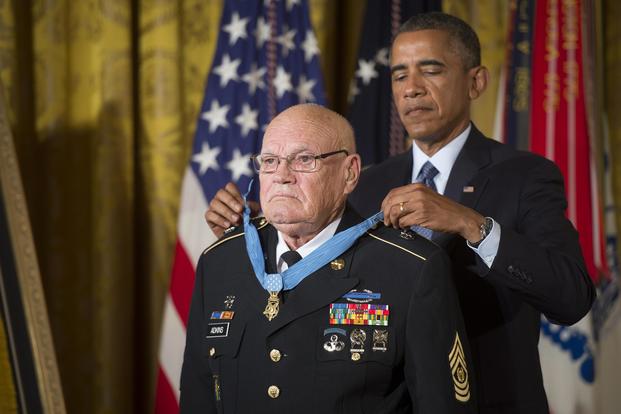Retired Army Command Sgt. Maj. Bennie Adkins, a Medal of Honor recipient and Special Forces legend through three tours in Vietnam, died Friday at age 86 after a 23-day last battle against coronavirus.
"We lost a great husband, father and warrior today. Bennie G. Adkins passed away this afternoon. Please keep his family in your prayers," Adkins' family said in a Twitter post.
Adkins was diagnosed with coronavirus and respiratory failure when he was admitted to East Alabama Medical Center in Opelika, Alabama, on March 26.
Related: Legendary Medal of Honor Recipient Now Critically Ill with Coronavirus
His son, Keith, told the Opelika-Auburn News in Alabama at the time that "We're very appreciative of the prayers and support from people, frankly, from around the country. We're hopeful for the best, but realistic as well."
The Bennie G. Adkins Foundation, created by the MOH recipient to provide scholarships to Special Forces troops and their families, said on Facebook that "The COVID-19 pandemic has hit home. Bennie has been hospitalized and is critically ill with COVID-19 respiratory failure."
Adkins was awarded the nation's highest honor for valor in a September 2014 White House ceremony by President Barack Obama in recognition of his three-day battle 48 years earlier with mortars, grenades and a sawed-off shotgun in Vietnam's forbidding A Shau valley.
"God bless his soul. It's a great loss to America," said retired Marine Maj. Gen. James Livingston, a Medal of Honor recipient for his actions in the Vietnam battle of Dai Do in 1968 and a long-time friend and admirer of Adkins.
"We became fairly close" over the years, Livingston said. Adkins made a point to join Livingston, an Auburn alumnus, at events at Auburn University in Alabama, and Livingston would attend annual fundraisers in Birmingham for Adkins' Foundation.
At Auburn, one of the fraternities would send over a jeep to pick up Adkins for events where students were in awe of his record and struck by his plainspoken humility.
"He was an absolute role model," Livingston said.
"He'd tell his story, how he was a humble man from Oklahoma" who found his way in the Army, and "he certainly motivated people. Bennie always achieved that."
Adkins' valor in the A Shau valley also had a special resonance for Livingston. He recalled hearing tales of units suffering heavy losses in the valley when he took over as commander of Echo company, 2nd Battalion, Fourth Marines, in late 1967.
In March 1966, Adkins was sent to join two officers and 10 enlisted troops from the Fifth Special Forces Group at Camp A Shau in the triple-canopy valley that ran west from Hue city to the Ho Chi Minh trail in Cambodia.
At about 2 a.m. on March 9, 1966, "they hit us," Adkins said in a 2018 interview with Military.com. "They laid down some mortar, 82 and 120 mortars on us initially. Then mass assaults."
At one point, the North Vietnamese had his unit surrounded at night. "We started hearing a noise and then we could see the eyes -- about a 400-pound Indonesian tiger was stalking us that night.
"The North Vietnamese soldiers -- they backed away from us" because of the tiger "and gave us room and we were able to get away," he said.
While "the tiger kinda' helped," he said, the battle continued for another two days.
His medal citation stated that:
"During the thirty-eight-hour battle and forty-eight hours of escape and evasion, fighting with mortars, machine guns, recoilless rifles, small arms, and hand grenades, it was estimated that Sergeant First Class Adkins killed between 135 and 175 of the enemy while sustaining eighteen different wounds to his body."
Livingston recalled being with Adkins and more than 25 other Medal of Honor recipients when they were honored at Nationals Park in Washington, D.C., before the start of the 2018 baseball All-Star Game.
Adkins was first out of the dugout, using a walker to get to his place on the baseline. He took his hands off the walker, came to attention, and gave the crowd a crisp salute. The stands erupted in prolonged cheers and the ballplayers later stood in line to meet him.
"They all came by," Adkins said of the ballplayers. "They were a nice group of young men. You could tell they were quality people."
The actor Bradley Cooper narrated a video on the history of the Medal of Honor that night:
"You don't win a Medal of Honor. It is earned by the rarest of heroes, heroes who reveal the remarkable capacity of their character. They connect us through the ideals they proudly represent. Tonight, in our nation's capital, it is our honor to welcome these true American heroes."
-- Richard Sisk can be reached at Richard.Sisk@Military.com.
Read More: Marine Dies During Training at 29 Palms












